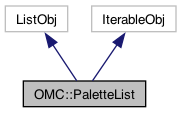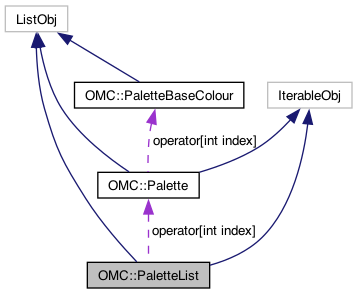
|

|
Represents and provides methods to create and access Palette objects from the current project.
Behaves as a container list for Palette object types.
The project's PaletteList can be accessed via OMC::Project.palettes.
A Simple Example - Removing all the current scene palettes, creating new palettes and list their names.
Public Member Functions | |
| bool | contains (OMC::Palette *palette) |
| Checks if the list contains a given Palette object. More... | |
| Array [OMC::Palette *] | list () |
| Converts the dynamic list into a concrete list of Palette objects. More... | |
| Array [QString] | palette_names () |
| Lists the Palette objects names. More... | |
| OMC::Palette * | create (QString paletteType="", QString name="", bool overwrite=False, unsigned int index=-1, QString specifiedPath="") |
| Creates a new Palette on this PaletteList at the position specified by 'index'. creations at index -1, will be at the back of the paletteList. More... | |
| void | remove (OMC::Palette *palette) |
| Remove the palette provided as an argument. Throws error if unsuccessful. More... | |
| OMC::Palette * | duplicate (OMC::Palette *palette, QString name="") |
| Duplicates an existing Palette object and inserts it to the back of this PaletteList. More... | |
| OMC::Palette * | clone (OMC::Palette *palette, QString name="") |
| Clones an existing Palette object and inserts it to the back of this PaletteList. The cloned Palette will share the same id as the source Palette, although they'll have different system paths. More... | |
| void | reorder (OMC::Palette *palette, int index) |
| Reorders the internal list by moving a the specified Palette item to the given index. Throws error if unsuccessful. More... | |
| void | move_palette_up (OMC::Palette *palette) |
| Moves the Palette up one index. Throws error if unsuccessful. More... | |
| void | move_palette_down (OMC::Palette *palette) |
| Moves the Palette down one index. Throws error if unsuccessful. More... | |
| void | clear () |
| Clears the PaletteList and deletes them from the system. Throws error if unsuccessful. More... | |
| OMC::Palette * | find (QString palette_id, bool lookInLinkedPalettes) |
| Finds the Palette object on the list with the given 'palette_id'. More... | |
| OMC::Palette * | palette_containing_colour (OMC::PaletteBaseColour *colour) |
| Finds the Palette, within the PaletteList, which contains the given color object or color ID. More... | |
| OMC::Element * | element () |
| Retrieves the element object that owns the PaletteList, if the PaletteList is stored in an element. More... | |
| void | lock () |
| Try to obtain the database lock. The lock will be held until it is released in script or the ui. Safe to call multiple time to get the lock state. Throws error if unsuccessful. More... | |
| void | release () |
| Try to release the database lock. Release access to the Palette. Other users will be able to obtain the access rights to the Palette. Throws error if unsuccessful. More... | |
Public Attributes | |
| OMC::Palette * | operator[int index] |
| Provides the Palette object at the given index. More... | |
| QString | path |
| The path to the PaletteList on disk. More... | |
| bool | valid |
| True if the PaletteList object is valid. More... | |
| bool | loaded |
| Identifies if the PaletteList was successfully loaded from the disk. More... | |
| QString | id |
| The PaletteList ID of this PaletteList. More... | |
| QString | type |
| The type of PaletteList, coudl either be Colour or Pencil Texture. More... | |
| int | element_id |
| The element id in which the Palette is stored if location is ELEMENT. Returns None if the Palette is not stored in an element. More... | |
| bool | locked |
| Whether the Palette locked is currently locked for modifications. More... | |
| void OMC::PaletteList::clear | ( | ) |
Clears the PaletteList and deletes them from the system. Throws error if unsuccessful.
Example:
| OMC::Palette* OMC::PaletteList::clone | ( | OMC::Palette * | palette, |
| QString | name = "" |
||
| ) |
Clones an existing Palette object and inserts it to the back of this PaletteList. The cloned Palette will share the same id as the source Palette, although they'll have different system paths.
Example:
| bool OMC::PaletteList::contains | ( | OMC::Palette * | palette | ) |
| OMC::Palette* OMC::PaletteList::create | ( | QString | paletteType = "", |
| QString | name = "", |
||
| bool | overwrite = False, |
||
| unsigned int | index = -1, |
||
| QString | specifiedPath = "" |
||
| ) |
Creates a new Palette on this PaletteList at the position specified by 'index'. creations at index -1, will be at the back of the paletteList.
Example:
| OMC::Palette* OMC::PaletteList::duplicate | ( | OMC::Palette * | palette, |
| QString | name = "" |
||
| ) |
Duplicates an existing Palette object and inserts it to the back of this PaletteList.
Example:
| OMC::Element* OMC::PaletteList::element | ( | ) |
Retrieves the element object that owns the PaletteList, if the PaletteList is stored in an element.
Example:
| OMC::Palette* OMC::PaletteList::find | ( | QString | palette_id, |
| bool | lookInLinkedPalettes | ||
| ) |
Finds the Palette object on the list with the given 'palette_id'.
| lookInLinkedPalettes | : whether to look in other accessible palettes, typically the scene PaletteList when searching from an element PaletteList. |
Example:
| Array [OMC::Palette*] OMC::PaletteList::list | ( | ) |
| void OMC::PaletteList::lock | ( | ) |
Try to obtain the database lock. The lock will be held until it is released in script or the ui. Safe to call multiple time to get the lock state. Throws error if unsuccessful.
Example:
| void OMC::PaletteList::move_palette_down | ( | OMC::Palette * | palette | ) |
Moves the Palette down one index. Throws error if unsuccessful.
Example:
| void OMC::PaletteList::move_palette_up | ( | OMC::Palette * | palette | ) |
Moves the Palette up one index. Throws error if unsuccessful.
Example:
| OMC::Palette* OMC::PaletteList::palette_containing_colour | ( | OMC::PaletteBaseColour * | colour | ) |
Finds the Palette, within the PaletteList, which contains the given color object or color ID.
Example:
| Array [QString] OMC::PaletteList::palette_names | ( | ) |
Lists the Palette objects names.
Example:
| void OMC::PaletteList::release | ( | ) |
| void OMC::PaletteList::remove | ( | OMC::Palette * | palette | ) |
Remove the palette provided as an argument. Throws error if unsuccessful.
Example:
| void OMC::PaletteList::reorder | ( | OMC::Palette * | palette, |
| int | index | ||
| ) |
Reorders the internal list by moving a the specified Palette item to the given index. Throws error if unsuccessful.
Example:
|
read |
|
read |
The PaletteList ID of this PaletteList.
|
read |
Identifies if the PaletteList was successfully loaded from the disk.
|
read |
Whether the Palette locked is currently locked for modifications.
| OMC::Palette* OMC::PaletteList::operator[int index] |
Provides the Palette object at the given index.
Example:
|
read |
The path to the PaletteList on disk.
|
read |
The type of PaletteList, coudl either be Colour or Pencil Texture.
|
read |
True if the PaletteList object is valid.

